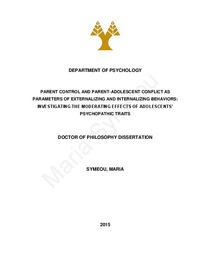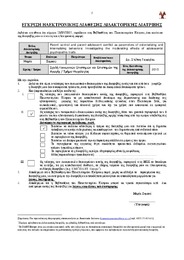| dc.contributor.advisor | Georgiou, Stelios | en |
| dc.contributor.author | Symeou, Maria K. | en |
| dc.coverage.spatial | Κύπρος | el |
| dc.coverage.spatial | Cyprus | en |
| dc.creator | Symeou, Maria K. | en |
| dc.date.accessioned | 2015-06-04T08:15:43Z | |
| dc.date.accessioned | 2017-08-03T10:42:41Z | |
| dc.date.available | 2015-06-04T08:15:43Z | |
| dc.date.available | 2017-08-03T10:42:41Z | |
| dc.date.issued | 2015-05 | |
| dc.date.submitted | 2015-05-13 | |
| dc.identifier.uri | https://gnosis.library.ucy.ac.cy/handle/7/39520 | en |
| dc.description | Includes bibliographical references (p. 205-228). | en |
| dc.description | Number of sources in the bibliography: 155 | en |
| dc.description | Thesis (Ph. D.) -- University of Cyprus, Faculty of Social Sciences and Education, Department of Psychology, 2015. | en |
| dc.description | The University of Cyprus Library holds the printed form of the thesis. | en |
| dc.description.abstract | Η παρούσα διατριβή αφορά την διερεύνηση της σχέσης ανάμεσα σε γονεϊκούς παράγοντες και προσωπικά χαρακτηριστικά στην εμφάνιση εξωτερικευμένων και εσωτερικευμένων συμπεριφορών. Επίσης, η έρευνα έχει σκοπό να εξετάσει το ρυθμιστικό ρόλο των ψυχοπαθητικών χαρακτηριστικών των εφήβων (= callous-unemotional traits, ναρκισσισμός και παρορμητικότητα) στη σχέση μεταξύ γονεϊκού ελέγχου, σύγκρουσης γονέα-εφήβου, και των εξωτερικευμένων και εσωτερικευμένων συμπεριφορών. Διερευνήθηκε, ακόμη, η παρορμητικότητα τόσο με τη χρήση ποσοτικών μετρήσεων όσο και μέσω συμπεριφορικών τεστ, προκειμένου να εξεταστούν πιθανές διαφορές ανάμεσα σε ομάδες όσον αφορά τα επίπεδα εμφάνισης της συμπεριφοράς αυτής. Προς εξέταση των πιο πάνω ερωτημάτων, η παρούσα μελέτη έγινε σε δύο φάσεις. Στη πρώτη φάση οι συμμετέχοντες έλαβαν μέρος σε ποσοτικές μετρήσεις, ενώ, στη δεύτερη φάση, ένα δείγμα εφήβων επιλέχθηκε να λάβει μέρος σε συμπεριφορικά τεστ μέτρησης της παρορμητικότητας. Η πρώτη φάση της έρευνας περιελάμβανε 538 εφήβους και τους γονείς τους (513 μητέρες και 464 πατέρες). Οι έφηβοι συμπλήρωσαν το Youth Psychopathic Traits Inventory (YPI), και το Children’s Report on Parent Behavior Inventory (CRPBI), ενώ οι γονείς συμπλήρωσαν την υποκλίμακα σύγκρουσης του Child-Parent Relationship Scale (CPRS), και το Child Behavior Checklist – Parent Report (CBCL). Η δεύτερη φάση της έρευνας περιλάμβανε 36 εφήβους, οι οποίοι αναγνωρίστηκαν, μέσα από στατιστικές αναλύσεις κατά την πρώτη φάση, ως ακραίες περιπτώσεις όσον αφορά την έκθεσή τους σε εξωτερικευμένες και εσωτερικευμένες συμπεριφορές. Οι 36 συμμετέχοντες συμπλήρωσαν το Self-Rated Dysexecutive Questionnaire (DEX), και το Youth Self-Report (YSR). Επιπλέον, οι έφηβοι συμπλήρωσαν δύο συμπεριφορικά τεστ μέτρησης της παρορμητικότητας – το GoStop Impulsivity Paradigm, και το Two Choice Impulsivity Paradigm. Τα αποτελέσματα της πρώτης φάσης έδειξαν ότι συγκεκριμένες γονεϊκές πρακτικές, καθώς και συγκεκριμένα προσωπικά χαρακτηριστικά, σχετίζονται τόσο με τις εξωτερικευμένες όσο και με τις εσωτερικευμένες συμπεριφορές. Συγκεκριμένα, η χρήση ψυχολογικού ελέγχου, η σύγκρουση γονέα-εφήβου και η παρορμητικότητα, προβλέπουν θετικά τις εξωτερικευμένες συμπεριφορές. Παράλληλα, η χρήση ψυχολογικού ελέγχου και η σύγκρουση γονέων-εφήβων προβλέπουν θετικά και τις εσωτερικευμένες συμπεριφορές. Επιπλέον, η σχέση μεταξύ συγκεκριμένων όψεων της γονικότητας και των εξωτερικευμένων και εσωτερικευμένων συμπεριφορών ρυθμίζεται από τα ψυχοπαθητικά χαρακτηριστικά των εφήβων. Περαιτέρω αναλύσεις δεδομένων κατέδειξαν διαφορές ανάμεσα σε ομάδες. Αξιοσημείωτο ήταν το αποτέλεσμα ότι έφηβοι που εμφάνιζαν είτε υψηλά είτε χαμηλά επίπεδα εξωτερικευμένων συμπεριφορών, διέφεραν μεταξύ τους όσον αφορά τα επίπεδα των ψυχοπαθητικών χαρακτηριστικών τους. Συγκεκριμένα, τα ποσοστά των C-U traits, ναρκισσισμού και παρορμητικότητας ήταν στατιστικά υψηλότερα στους έφηβους με υψηλά ποσοστά εξωτερικευμένων συμπεριφορών. Τα αποτελέσματα της δεύτερης φάσης της έρευνας κατέδειξαν ότι η σχέση μεταξύ συγκεκριμένων όψεων της γονικότητας και των εξωτερικευμένων και εσωτερικευμένων συμπεριφορών ρυθμίζεται από την παρορμητική συμπεριφορά των εφήβων. Πιο συγκεκριμένα, η παρορμητικότητα ρύθμιζε τη σχέση μεταξύ του πατρικού ψυχολογικού ελέγχου και εξωτερικευμένων συμπεριφορών, της σύγκρουσης μητέρας-εφήβου και εσωτερικευμένων συμπεριφορών, καθώς και του πατρικού συμπεριφορικού ελέγχου και εσωτερικευμένων συμπεριφορών. Διερεύνηση των διαφορών ανάμεσα στις υποομάδες, σε σχέση με τα επίπεδα παρορμητικότητας, δεν έχει καταδείξει στατιστικά σημαντικά αποτελέσματα. Τα αποτελέσματα της έρευνας συζητούνται σε σχέση με τη σύνδεση τους με προηγούμενες έρευνες, τη θεωρητική τους συνεισφορά και τις πρακτικές εφαρμογές τους. | el |
| dc.description.abstract | The aims of the present study were to explore the impact of parental and personal characteristics on adolescent’s expression of externalizing and internalizing behaviors, as well as, to examine the way that adolescents’ psychopathic traits (= callous-unemotional traits, narcissism, and impulsivity) moderate the relationship between parent control, parent-adolescent conflict, and the development of externalizing and internalizing behaviors. Additionally, one psychopathic trait, namely impulsivity, was explored using both quantitative and behavioural measures, in order to examine group differences in the levels of impulsive behaviour. To address these questions, the present study was comprised of two phases: phase one, wherein participants completed quantitative measures, and phase two, wherein a stratified sample of adolescent participants was selected to complete behavioral measures of impulsivity. The first phase of the study included 538 adolescents and their parents (513 mothers and 464 fathers). Adolescents completed the Youth Psychopathic Traits Inventory (YPI), and the Children’s Report on Parent Behavior Inventory (CRPBI), while parents completed the conflict subscale of the Child-Parent Relationship Scale (CPRS), as well as, the Child Behavior Checklist – Parent Report (Short Form; CBCL). The second phase of the study included 36 adolescents who had been identified from the first phase of the study and through statistical calculations as extreme cases in terms of their exhibition of externalizing and internalizing behaviors. The 36 participants completed the Self-Rated Dysexecutive Questionnaire (DEX), and the Youth Self-Report (Short Form; YSR). Additionally, adolescents completed two behavioral measures of impulsivity; the GoStop Impulsivity Paradigm, and the Two Choice Impulsivity Paradigm. Results of the first phase of the study showed that certain parental practices and personal characteristics are related to externalizing and internalizing behaviors. Specifically, psychological control, parent-adolescent conflict, and impulsivity positively predicted externalizing behaviors, whereas psychological control and parent-adolescent conflict positively predicted internalizing behaviors. Furthermore, the relationship between certain aspects of parenting and externalizing and internalizing behaviors was moderated by adolescent’s psychopathic traits. Further data analyses demonstrated a number of group differences; of particular interest were the findings that adolescents who displayed either high or low externalizing behaviors differed in their levels of psychopathic traits. Results of the second phase of the study further demonstrated the moderation role of impulsivity in the relationship between parental control, parent-adolescent conflict, and externalizing and internalizing behaviors; more specifically, impulsivity moderated the relationships between father psychological control and externalizing behaviors, mother-adolescent conflict and internalizing behaviors, and father behavior control and internalizing behaviors. Nevertheless, examination of group differences in the levels of impulsivity for adolescents who displayed either low or high externalizing and internalizing behaviors has not yielded significant findings. In other words, in contrast to the findings from the first phase of the study, levels of impulsivity were not significantly different between adolescents who exhibited high externalizing behaviors and the control group. Even though the results from the two phases of the study are not in agreement, this is not an uncommon finding. The results are discussed in relation to the connection with earlier studies, the theoretical contribution, and the implications in applied settings. | en |
| dc.format.extent | xix, 248 p. ; 30 cm. | en |
| dc.language.iso | eng | en |
| dc.publisher | Πανεπιστήμιο Κύπρου, Σχολή Κοινωνικών Επιστημών και Επιστημών Αγωγής / University of Cyprus, Faculty of Social Sciences and Education | |
| dc.rights | info:eu-repo/semantics/openAccess | en |
| dc.rights | Open Access | en |
| dc.subject.lcsh | Behavioral Assessment of teenagers | en |
| dc.subject.lcsh | Behavioral assessment of children | en |
| dc.subject.lcsh | Adolescence behavior Psychology | en |
| dc.subject.lcsh | Conflict (Psychology) in adolescence | en |
| dc.subject.lcsh | Conflict (Psychology) in children | en |
| dc.subject.lcsh | Impulsive behavior | en |
| dc.subject.lcsh | Parent and teenager | en |
| dc.subject.lcsh | Parent and child | en |
| dc.subject.lcsh | Adolescent psychotherapy Research | en |
| dc.title | Parent control and parent-adolescent conflict as parameters of externalizing and internalizing behaviors : investigating the moderating effects of adolescents' psychopathic traits | en |
| dc.title.alternative | Γονεϊκός έλεγχος και σύγκρουση γονέα-παιδιού ως παράμετροι εξωτερικευμένων και εσωτερικευμένων συμπεριφορών: Ο ρυθμιστικός ρόλος των ψυχοπαθητικών χαρακτηριστικών των εφήβων | el |
| dc.type | info:eu-repo/semantics/doctoralThesis | en |
| dc.contributor.committeemember | Γεωργίου, Στέλιος | el |
| dc.contributor.committeemember | Κωνσταντινίδου, Φώφη | el |
| dc.contributor.committeemember | Σταυρινίδης, Παναγιώτης | el |
| dc.contributor.committeemember | Κυριακίδης, Λεωνίδας | el |
| dc.contributor.committeemember | Georgiou, Stelios | en |
| dc.contributor.committeemember | Constantinidou, Fofi | en |
| dc.contributor.committeemember | Stavrinides, Panayiotis | en |
| dc.contributor.committeemember | Kyriakides, Leonidas | en |
| dc.contributor.committeemember | Buchanan, Ann | en |
| dc.contributor.department | Πανεπιστήμιο Κύπρου, Σχολή Κοινωνικών Επιστημών και Επιστημών Αγωγής, Τμήμα Ψυχολογίας | el |
| dc.contributor.department | University of Cyprus, Faculty of Social Sciences and Education, Department of Psychology | en |
| dc.subject.uncontrolledterm | ΓΟΝΙΚΟΣ ΕΛΕΓΧΟΣ (ΣΥΜΠΕΡΙΦΟΡΙΚΟΣ ΕΛΕΓΧΟΣ, ΨΥΧΟΛΟΓΙΚΟΣ ΕΛΕΓΧΟΣ) | el |
| dc.subject.uncontrolledterm | ΣΥΓΚΡΟΥΣΗ ΓΟΝΕΑ-ΕΦΗΒΟΥ | el |
| dc.subject.uncontrolledterm | ΕΞΩΤΕΡΙΚΕΥΜΕΝΕΣ ΚΑΙ ΕΣΩΤΕΡΙΚΕΥΜΕΝΕΣ ΣΥΜΠΕΡΙΦΟΡΕΣ | el |
| dc.subject.uncontrolledterm | ΨΥΧΟΠΑΘΗΤΙΚΑ ΧΑΡΑΚΤΗΡΙΣΤΙΚΑ (C-U TRAITS, ΝΑΡΚΙΣΣΙΣΜΟΣ, ΠΑΡΟΡΜΗΤΙΚΟΤΗΤΑ) | el |
| dc.subject.uncontrolledterm | ΕΦΗΒΕΙΑ | el |
| dc.subject.uncontrolledterm | PARENTAL CONTROL (BEHAVIORAL CONTROL, PSYCHOLOGICAL CONTROL) | en |
| dc.subject.uncontrolledterm | PARENT-ADOLESCENT CONFLICT | en |
| dc.subject.uncontrolledterm | EXTERNALIZING AND INTERNALIZING BEHAVIORS | en |
| dc.subject.uncontrolledterm | PSYCHOPATHIC TRAITS (C-U TRAITS, NARCISSISM, IMPULSIVITY) | en |
| dc.subject.uncontrolledterm | ADOLESCENCE | en |
| dc.identifier.lc | BF724.25.S96 2015 | en |
| dc.author.faculty | Σχολή Κοινωνικών Επιστημών και Επιστημών Αγωγής / Faculty of Social Sciences and Education | |
| dc.author.department | Τμήμα Ψυχολογίας / Department of Psychology | |
| dc.type.uhtype | Doctoral Thesis | en |
| dc.rights.embargodate | 2015-11-13 | |
| dc.contributor.orcid | Georgiou, Stelios [0000-0003-0419-1214] | |


